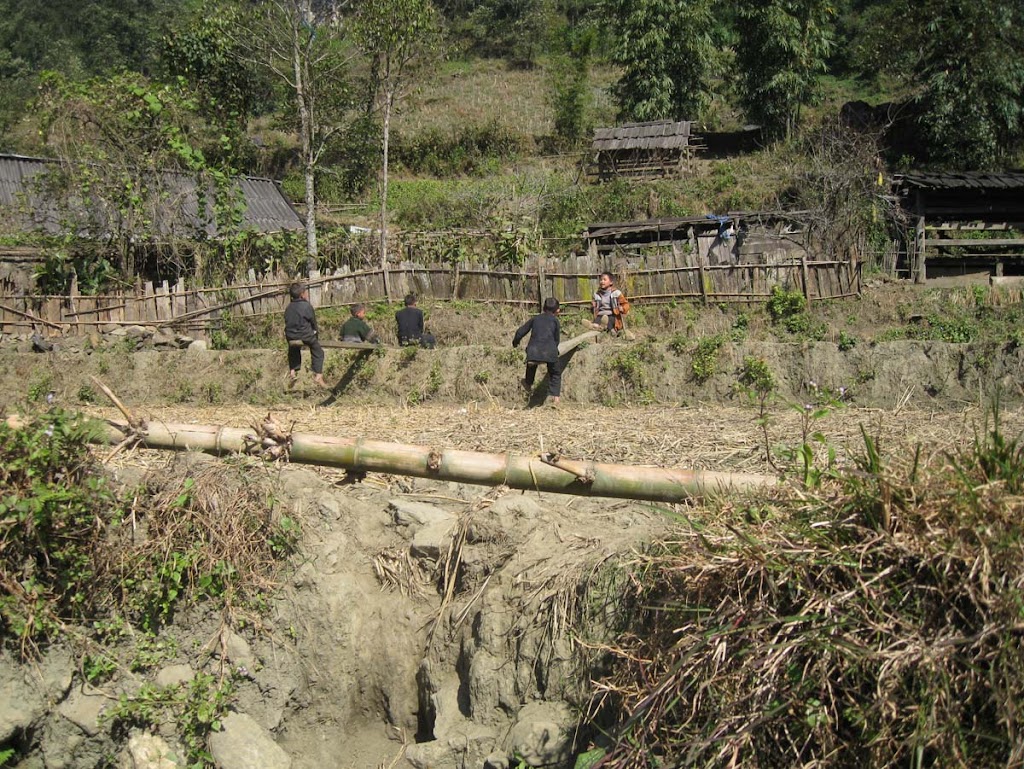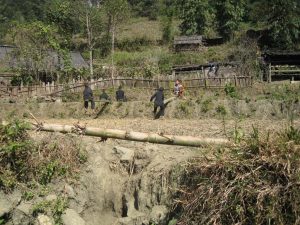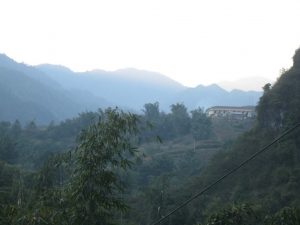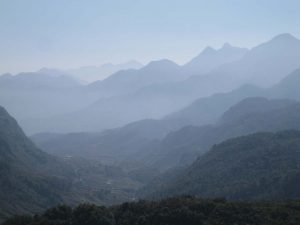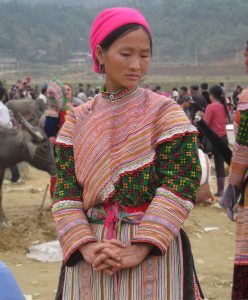Photos
Children playing in Sin Chai village
School volunteers may teach in
Sapa mountains
Woman in traditional clothes of the flower minority at Bak Ca Market
We escaped being run over by the motorbikes in Hanoi but have not escaped being run over by a masseur here in Sapa. For the grand finale of the allover pummelling, pounding and wrenching of the neck the thankfully lightweight masseur mounted first the table and then my back upon which she ran up and down as I lay beached on my stomach. Craning my neck, I tried to establish quite what was happening, but only managed to glimpse the faded giant wall poster of Persephone and her lover embracing naked on a swing.
We have spent three nights back in Sapa and I am now going to try and impress any readers who are still with us with details of our social life, plus present an as yet unsolved mystery.
Evening 1
One of Phuong’s friends has arrived unexpectedly in Sapa with his new bride for the three day honeymoon (two of the nights spent in bunk beds on the train journey from Hanoi) Both are officers at the government police academy. On this one stationary evening of the honeymoon the five of us share a Lau (communal soup) in a freezing open to the street restaurant. The groom speaks some English, the bride does not, but almost the entire evening is conducted in English. I fear she is not impressed by this first non train compartment evening of marriage, whereas Nga appears all the while to be in a state of dreamy euphoria. Now here’s the mystery. The chicken in the Lau soup is from the black M’ong tribe village and both the skin and the bones are black. How can this be? I try to hypothesise using the learnt dog eats dog, fish eats fish (and human excrement) model that I have learnt here but do not reach a solution.
Evening 2
After many phone calls to the lecturer in Hanoi who has a sideline in writing papers on hill-tribes and was meant to smooth the paperwork and effect a meeting with two young ladies in Ban Ho, the aforementioned turn up in Sapa to meet us. They are not wearing tribal attire but very thin modern clothing and we all freeze together at another open to the street night restaurant. They are charming, shy, and speak very little English. Through Phuong we talk about their life in the village and their hopes for training, learning English and work. Colin has asked us to think about appropriateness of a scholarship at Hanoi University. Phuong says if people from the village go to Hanoi for six months they will never come back. This feels uncomfortable –a bit like the secret millionaire- we recommend to Colin that the nearest training college is supported (perhaps with volunteer input?) and maybe a scholarship system established. On returning to our unheated hotel I discover that the Karaoke sign was not just a favoured decoration.
Evening 3
It’s a small world. On the steps of the local market bordering China Peter bumps into someone we got friendly with in Hanoi; a senior fellow in English language at Hanoi University who has been working for the Vietnamese Ministry of Education for two years. This is marvellous because it allows us to meet and bounce off ideas over a meal that we have been mulling over since we have been in this mountainous region. To extend the above overused adage even further we discover that Helen’s sister is a nurse in Oxford who remembers giving us our injections prior to departure. We get excited.. I am busy trying to adapt the English Language national curriculum Units 3 &4 into ‘language in use’ rather than rote learning.. Colin can encourage the backing and engagement of the university.. Was it Dickens who was criticized for narrative plot relying too heavily on co-incidence? Helen has been advising the Education Department.. too much rice wine.
At 1.30 a.m. Peter leaves the bedroom in my rose pink dressing gown armed with the phrase ‘Enough’, in Vietnamese, to address the male karaoke singers who I suspect are senior members of the local People’s Party. I hope he comes back intact.
